Related Research Articles

In ancient Greek mythology and religion, Artemis is the goddess of the hunt, the wilderness, wild animals, nature, vegetation, childbirth, care of children, and chastity. She was heavily identified with Selene, the Moon, and Hecate, another Moon goddess, and was thus regarded as one of the most prominent lunar deities in mythology, alongside the aforementioned two. She would often roam the forests of Greece, attended by her large entourage, mostly made up of nymphs, some mortals, and hunters. The goddess Diana is her Roman equivalent.

Eris is the Greek goddess of strife and discord. Her Roman equivalent is Discordia, which means the same. Eris's Greek opposite is Harmonia, whose Roman counterpart is Concordia. Homer equated her with the war-goddess Enyo, whose Roman counterpart is Bellona. The dwarf planet Eris is named after the goddess.

Minerva is the Roman goddess of wisdom, justice, law, victory, and the sponsor of arts, trade, and strategy. Minerva is not a patron of violence such as Mars, but of strategic war. From the second century BC onward, the Romans equated her with the Greek goddess Athena. Minerva is one of the three Roman deities in the Capitoline Triad, along with Jupiter and Juno.

Venus is a Roman goddess, whose functions encompass love, beauty, desire, sex, fertility, prosperity, and victory. In Roman mythology, she was the ancestor of the Roman people through her son, Aeneas, who survived the fall of Troy and fled to Italy. Julius Caesar claimed her as his ancestor. Venus was central to many religious festivals, and was revered in Roman religion under numerous cult titles.
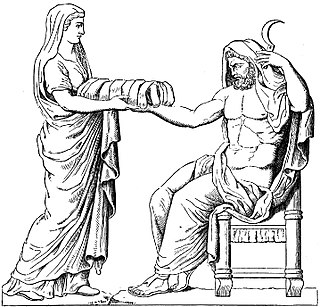
Rhea or Rheia is a mother goddess in ancient Greek religion and Greek mythology, the Titaness daughter of the earth goddess Gaia and the sky god Uranus, himself a son of Gaia. She is the older sister of Cronus, who was also her consort, and the mother of the five eldest Olympian gods Hestia, Demeter, Hera, Poseidon and Zeus, and the king of the Underworld, Hades.
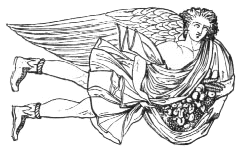
In Greek mythology, Astraeus or Astraios was an astrological deity. Some also associate him with the winds, as he is the father of the four Anemoi, by his wife, Eos.

Cybele is an Anatolian mother goddess; she may have a possible forerunner in the earliest neolithic at Çatalhöyük, where statues of plump women, sometimes sitting, accompanied by lionesses, have been found in excavations. Phrygia's only known goddess, she was probably its national deity. Greek colonists in Asia Minor adopted and adapted her Phrygian cult and spread it to mainland Greece and to the more distant western Greek colonies around the 6th century BC.

Agdistis is a deity of Greek, Roman, and Anatolian mythology who possesses both male and female reproductive organs. They were closely associated with the Phrygian goddess Cybele.

In ancient Roman religion, Ceres was a goddess of agriculture, grain crops, fertility and motherly relationships. She was originally the central deity in Rome's so-called plebeian or Aventine Triad, then was paired with her daughter Proserpina in what Romans described as "the Greek rites of Ceres". Her seven-day April festival of Cerealia included the popular Ludi Ceriales. She was also honoured in the May lustratio of the fields at the Ambarvalia festival, at harvest-time, and during Roman marriages and funeral rites. She is usually depicted as a mature woman.

Clotho is a mythological figure. She is the youngest of the Three Fates or Moirai who spins the thread of human life; the other two draw out (Lachesis) and cut (Atropos) in ancient Greek mythology. Her Roman equivalent is Nona. She also made major decisions, such as when a person was born, thus in effect controlling people's lives. This power enabled her not only to choose who was born, but also to decide when gods or mortals were to be saved or put to death. For example, Clotho brought Pelops back to life when his father killed him.

Febris, or Dea Febris, is the Roman goddess of fevers, who embodied, but also protected people from fever and malaria. Because of this, Febris was a feared goddess whom people wanted the favour of. She does not have a myth of her own nor mentioned in a myth. Among her characteristic attributes are "shrewdness" and "honesty", according to Seneca the Younger's Apocolocyntosis.

In ancient Greek religion and mythology, Iris is a daughter of the gods Thaumas and Electra, the personification of the rainbow and messenger of the gods, a servant to the Olympians and especially Queen Hera. Iris appears in several stories carrying messages from and to the gods or running errands but has no unique mythology of her own. Similarly, very little to none of a historical cult and worship of Iris is attested in surviving records, with only a few traces surviving from the island of Delos. In ancient art, Iris is depicted as a winged young woman carrying a caduceus, the symbol of the messengers, and a pitcher of water for the gods. Iris was traditionally seen as the consort of Zephyrus, the god of the west wind and one of the four Anemoi, by whom she is the mother of Pothos in some versions.
A tutelary is a deity or a spirit who is a guardian, patron, or protector of a particular place, geographic feature, person, lineage, nation, culture, or occupation. The etymology of "tutelary" expresses the concept of safety and thus of guardianship.
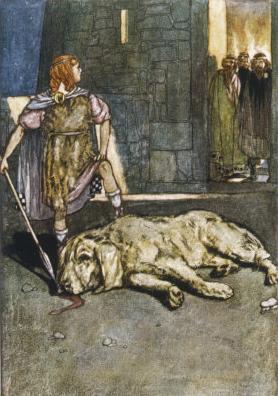
A demigod or demigoddess is a part-human and part-divine offspring of a deity and a human, or a human or non-human creature that is accorded divine status after death, or someone who has attained the "divine spark". An immortal demigod(-dess) often has tutelary status and a religious cult following, while a mortal demigod(-dess) is one who has fallen or died, but is popular as a legendary hero in various polytheistic religions. Figuratively, it is used to describe a person whose talents or abilities are so superlative that they appear to approach being divine.
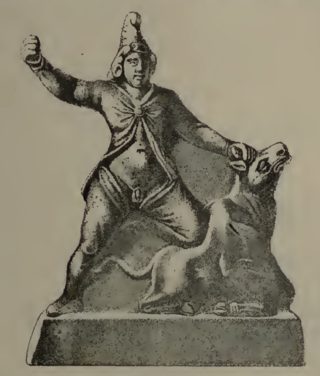
Attis was the consort of Cybele, in Phrygian and Greek mythology.
In Greek mythology, the primordial deities are the first generation of gods and goddesses. These deities represented the fundamental forces and physical foundations of the world and were generally not actively worshipped, as they, for the most part, were not given human characteristics; they were instead personifications of places or abstract concepts.
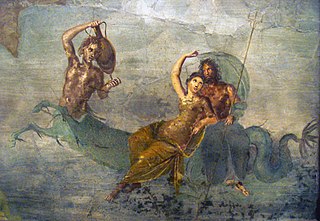
In ancient Roman mythology, Salacia was the female divinity of the sea, worshipped as the goddess of salt water who presided over the depths of the ocean. Neptune was her consort. That Salacia was the consort of Neptune is implied by Varro, and is positively affirmed by Seneca, Augustine and Servius. She is identified with the Greek goddess Amphitrite, consort of Poseidon.

Nenia Dea was an ancient funeral deity of Rome, who had a sanctuary outside of the Porta Viminalis. The cult of the Nenia is doubtlessly a very old one, but according to Georg Wissowa the location of Nenia's shrine (sacellum) outside of the center of early Rome indicates that she didn't belong to the earliest circle of Roman deities. In a different interpretation her shrine was located outside of the old city walls, because it had been custom for all gods connected to death or dying.

Roman mythology is the body of myths of ancient Rome as represented in the literature and visual arts of the Romans. One of a wide variety of genres of Roman folklore, Roman mythology may also refer to the modern study of these representations, and to the subject matter as represented in the literature and art of other cultures in any period. Roman mythology draws from the mythology of the Italic peoples and ultimately from Proto-Indo-European mythology.
References
- ↑ Smith, William (1851). A New Classical Dictionary of Greek and Roman Biography, Mythology, and Geography: Partly Based Upon the Dictionary of Greek and Roman Biography and Mythology. Harper & Brothers. p. 377.
- ↑ Turcan, Robert (2013-10-28). The Gods of Ancient Rome: Religion in Everyday Life from Archaic to Imperial Times. Routledge. p. 28. ISBN 978-1-136-05850-9.
- ↑ An Universal, Historical, Geographical, Chronological and Poetical Dictionary, Exactly Describing the Situation, Extent, Customs ... of All Kingdoms ...: Containing Likewise the Lives of the Patriarchs, Prophets, Apostles, and Primitive Fathers; Emperors, Kings, Princes ... J. Hartley ... W. Turner ... and Tho. Hodgson. 1703. p. 39.
